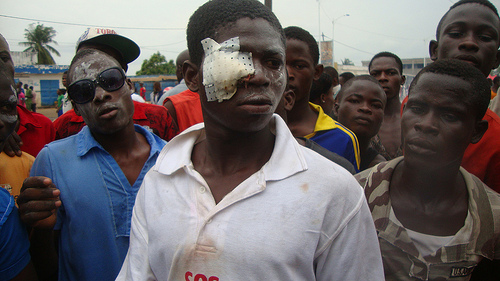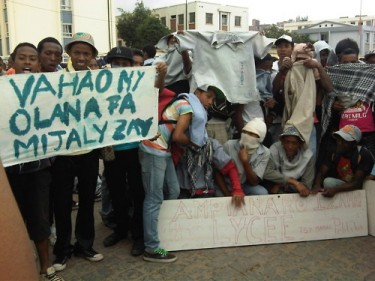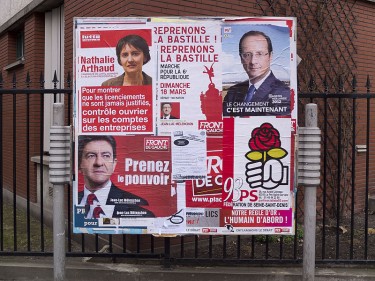[All links point to French resources unless otherwise stated]
We continue with the second part of our 2012 review of the Francophone world. The first half of the 2012 review (which can be found here [en]) focused on the armed rebellions and society projects linked to the economic crisis. Part two will review the civil rebellion and governance problems experienced in Togo, Chad and Madagascar, the citizen initiatives in Senegal, the fight for more transparency in public affairs in Cameroon and the ongoing debates on society in France.
Protests in Togo, Chad and Madagascar
Togo is currently in full political transition following the highly controversial presidential elections of 2005 which resulted in the son of the ex-President Gnassingbé Eyadema, Faure Gnassingbé Eyadema [en], taking power. The group ‘Let’s Save Togo’ (Collectif ‘Sauvons le Togo’ (CST)) counts several human rights defence groups and political parties among its supporters. Its main condemnation (amongst others) is the exploitation of certain institutions and the subsequent confiscation of riches from these institutions by the rich minority whilst the local population is plunged into mounting poverty. The demonstrations against the ruling power have been the setting for many violent clashes with the police during the year, as shown in the following photos and videos:

Repression at the demonstrations on 13 June 2012, by the group Let's Save Togo on Flickr with permission
This video shows police officers severely injuring a demonstrator [Warning: These images may shock certain audiences]:
In Chad, a coalition of organisations for the protection of human rights has expressed similar demands over the need to protect people’s right to the freedom of expression and to implement reforms for more social justice.
In Madagascar, the non-payment of salaries and bursaries to teachers and students has caused violent protests in May and in November. The protests against the current crisis are not limited to students and teachers: cattle farmers and even banks have been protesting against the chronic insecurity of the country.

“Sort out this problem because we are suffering” students on strike in Madagascar by Jentilisa (used with permission)
Post-election pride for Senegal but tough times ahead for Cameroon
Senegal:
The pre-electoral period was a particularly turbulent time in Senegal. The decision to endorse A.Wade’s candidacy for a third term by the Constitutional Counsel triggered a wave of violence and organisation of protests by the Senegalese opposition. The vote finally supports the opposition’s case that backed Macky Sall to victory on the 25th March. A new citizen initiative has allowed observers to verify the results of the elections in real time and to avoid any questioning of the validity of the verdict from the ballot boxes. Here is a video of the headquarters of Sunu 2012 during the night of the second round of the presidential election:
Cameroon: (by Julie Owono)
As well as being a country that is particularly hostile towards homosexuals, Cameroon has surpassed this by making front page news in 2012 during the Olympic Games in London when seven athletes withdrew from the national team. They decided to stay in Britain instead of returning to their country. Philippe Menkoué from Global Voices has tried to make sense of their choice and suggests that the work and life conditions of professional athletes in Cameroon have strongly contributed to this decision:
Ces fugues viennent tout simplement mettre en évidence le malaise qui anime la jeunesse camerounaise toute entière. Ainsi, d’après le blogueur camerounais Florian Nguimbis, ces athlètes ne sont pas à blâmer, mais plutôt le système tout entier.
The story of these fugitives simply shows the misery that is facing young people in Cameroon. According to the Cameroonian blogger Florian Nguimbis, these athletes are not to blame – rather it is the fault of the whole system itself.
The 2011 elections that saw P.Biya reelected with more than 75% of the vote seems to have made Cameroonians sceptical over the possibility of any deep reforms to the current system.
France: Change of power or Power to change? (by Suzanne Lehn)

Campaign posters by JC Benoist on Wikimedia CC License -3.0-BY
The most memorable event of 2012 would have been the presidential election in which the socialist François Hollande won in the second round against the departing president Nicolas Sarkozy, followed and confirmed by legislative elections. The electoral process was scrutinised abroad and people again started trying to guess the winner before the official announcement of the results.
We finish this round-up of 2012 with a little success story of a French film’s exceptional 5 Oscar wins “The Artist” – although not a typically sounding French film, it is homage to the silent movie era of which France was a pioneer.
Anna Gueye, Julie Owono, Abdoulaye Bah, Suzanne Lehn and Philippe Menkoue all contributed to this post.






